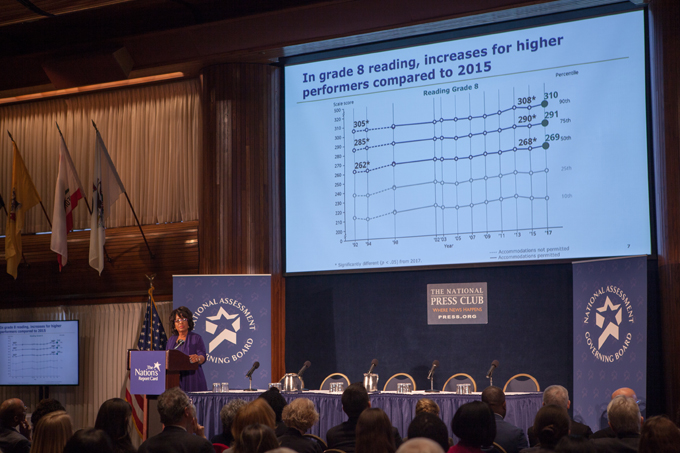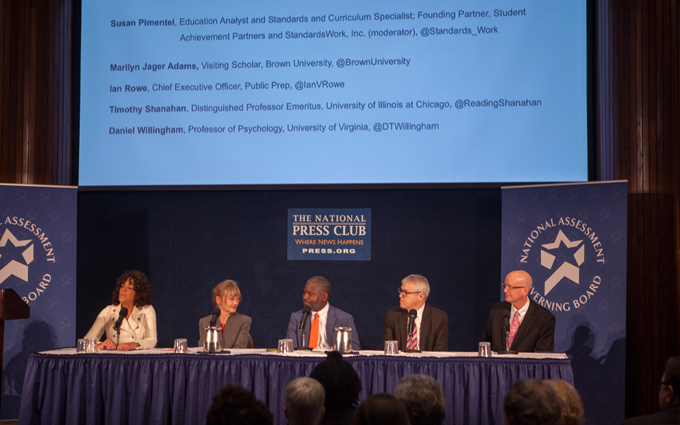 Test scores released Tuesday for the National Assessment of Educational Progress (NAEP) marked a decade of stalled educational advancement, with negligible improvements measured only for performance in eighth-grade reading.
Test scores released Tuesday for the National Assessment of Educational Progress (NAEP) marked a decade of stalled educational advancement, with negligible improvements measured only for performance in eighth-grade reading.
Aside from a handful of outliers—most notably Florida and California—national averages have barely budged, despite billions of dollars invested to improve outcomes.
Compared to 2015, there was a one-point increase in the average reading score in eighth grade, but no significant change in the average score for reading in fourth grade. Only 36% of eighth graders and 37% of fourth graders ranked at or above the Proficient achievement level.
Widening achievement gaps
Moreover, the results reveal a concerning trend in which the nation’s highest-performing eighth graders inched higher, while the results for the lowest-performing students declined—an indication that achievement gaps are widening.
In fourth-grade reading, the gap between the top 10% and the bottom 10% of students widened by four points. For eighth graders, national reading scores increased by three points—but only because students in the top 10% and top 25% scored higher. Scores for average and below-average students were flat.
“We know we need to accelerate the pace of reform and improvement in our urban schools, and we know our achievement gaps are still too wide,” said Michael Casserly, the executive director of the Council of the Great City Schools, speaking at a “NAEP Day” event in Washington, DC, “but these NAEP data give us the tools we need to ask hard questions about our instructional practices and where we need to improve.”
Improving reading comprehension
 After the presentation of scores, Susan Pimentel, a lead writer of the Common Core ELA standards, moderated a panel focused on improving reading comprehension through knowledge-based curriculum, rigorous texts, and home–school partnerships.
After the presentation of scores, Susan Pimentel, a lead writer of the Common Core ELA standards, moderated a panel focused on improving reading comprehension through knowledge-based curriculum, rigorous texts, and home–school partnerships.
Daniel Willingham, professor of psychology at the University of Virginia, said that, once students are fluent decoders, the key determinant of reading proficiency is background knowledge.
Ian Rowe, the CEO of Public Prep, agreed, using his own district as a powerful example. In 2010, the New York State Education Department dropped social studies state assessments for fifth and eighth graders, prompting teachers to replace social studies instructional time with English and math learning. As a result, students began struggling with reading comprehension because they did not have the necessary context or content knowledge.
“What really keeps us up at night are the early literacy outcomes,” said Rowe. “Because, frankly, that’s where the foundations are built.”
Pimentel stressed the importance of providing all students with rich, challenging texts. She said that although it’s common for teachers to give lower-level texts to struggling readers, this denies students exposure to more advanced vocabulary and language features.
Tim Shanahan, distinguished professor emeritus of education at the University of Illinois at Chicago and a past president of the International Reading Association (now the International Literacy Association), agreed that this practice is a disservice to struggling students, who spend the rest of their academic careers playing catch-up.
“What we need our kids to do is read things that are demanding enough to drive them to overcome barriers to understanding,” he said.
The panelists also touched on the importance of out-of-school factors, specifically family structure. Rowe said he would like to see a metric that measures the effects of home stability on educational achievement.
“Poor reading performance is a problem for all racial groups,” said Rowe. “Poor white kids are far from proficiency.”
What can we learn from Florida and California?
The event ended with a series of presentations by state superintendents, who shared what they’ve done to increase performance. Common threads included robust standards, strong accountability and evaluation measures, ongoing professional development, and equity-building practices.
Peggy Carr, acting commissioner of the National Center for Education Statistics, reported that “Something very good obviously is happening in Florida,” where 41% of the state’s fourth graders were proficient or better, compared with the nationwide average of 35%. Eighth graders scored three points higher on the reading test compared with 2015.
Florida Commissioner of Education Pam Stewart said she attributes these gains to the state’s more rigorous academic standards, tougher state tests, and long-standing accountability system.
California was another stand-out state, with a four-point increase in eighth-grade reading, driven by major gains in San Diego, Fresno, and Los Angeles. Glen Price, chief deputy superintendent for the California Department of Education, said the state has been working to build districtwide cultures of literacy.
“Students read and write every day. Students truly understand the content and context of what they’re reading and how it’s connected to their own lives,” he said. “They leave our system not just with increased test scores, but prepared for the world.”
Price said he looks forward to deep-diving into the NAEP results and using them to drive further improvements.
“We use them as a flashlight,” he said. “We use them to inform work at every level.”
Alina O'Donnell is the communications strategist at ILA and the editor of Literacy Daily.